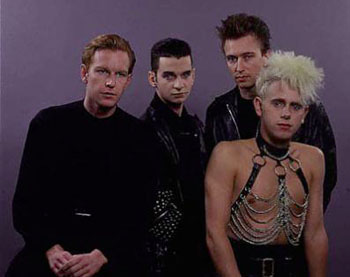![[Metroactive Music]](/music/gifs/music468.gif)
[ Music Index | Silicon Valley | Metroactive Home | Archives ]
 Depeche Mode's past rings more vividly than its present. Cavalcade of Decades Sometimes the music outlives the mores of an era By Gina Arnold DOWNTOWN SAN JOSE on a weekend can be a lonely place, a vista of empty streets and homeless people, some of whom honk like ducks. But one gorgeous late afternoon last week, I walked out of the San Jose Repertory Theater on Market Street, only to be confronted by the almost magical sight of three horses, fully saddled and "parked" at their very own streetlight, while in the background a host of young BMX bikers--temporarily grounded by the presence of the horses--glowered at the piles of manure. Although surrounded by well-wishers who were petting their soft brown noses, all three were seemingly ownerless. It seemed rather careless. I mean, granted, it's harder to steal a horse than a car, but on the other hand, the horses weren't exactly locked. We went and got our car from the garage, and when we emerged, we saw three cops crossing the street. I jammed on the brakes and yelled at one of them. "Hey! Are those your horses you've abandoned in the square?" The cop looked abashed. "We were only at Starbucks," he said sheepishly. "We could see them the whole time!" We snorted, slammed the window shut, then burst into giggles. As we watched them untie their friends, we could also see the BMXers preparing to mount their faithful steeds. As silly as it looked, the scene was really quite beautiful--and redolent of something purely San Jose, a mix of the Old West with the modern world that had knit together into a pattern that, briefly, made a lot of sense. The play we had gone to see, Ctrl+Alt+Delete, by Anthony Clarvoe, was actually addressing this very issue in its own way. The play tells the somewhat apocryphal tale of a high-tech business guru--a sort of Tom Peters/Jim Clark type--who's making millions in Silicon Valley by starting up various ventures and then using their high-flying stock prices to control the market. It was a weird play--and not only because, though set in 1998, it was already as dated as a gold chain and an Adidas tracksuit. Even without the events of Sept. 11, it might just as well have been set in the 19th century as in the 20th--that's how yesterday the whole thing felt. So far away--and so unbearably confusing--are one's memories of 1998, that when the fictional company's IPO opens up huge, and the characters start dancing to the U2 song "Pride (in the Name of Love)," one wasn't sure whether to cheer or hiss. It reminded me of a poem by W.H. Auden, "Sept. 1. 1939," which refers to the 1930s as "a low dishonest decade," and goes on to say, "Accurate scholarship can / Unearth the whole offence / From Luther until now/that has driven a culture mad." Speaking of the 20th century, driving home, I turned as I often do to San Jose radio station Star 101.3 FM. Its format--described as "rock of the '80s and '90s and now"--is currently the fastest-growing format in radio programming. This doesn't mean it's a big hit yet, according to Arbitron ratings: in the Bay Area, for instance, it's still being beaten out by Spanish, classical, country, urban, jazz, oldies, Top 40 and KFOG--but it's ahead of all other classic rock, hard rock, alternative rock and Adult Album Alternative stations (KITS, for example). Apparently, casual radio listeners would rather hear old Depeche songs than new ones. Well, I know I would. (Star 101.3 will be holding a one-year anniversary birthday bash Dec. 9 at the San Jose State University Events Center, featuring '80s-'90s rock stars the B-52s.) A look at those Arbitron ratings--invariably headed by talk-radio stations--would make one think that no one wants to hear rock & roll anymore: not new rock; not young rock; not underground rock; not techno. But those ratings lie, because younger people and music lovers no longer rely on clunky old radio waves to deliver their tunes: CD and MP3 players are portable, and easy to install in cars. The vogue for music of the '80s and '90s is probably just a glitch in the Zeitgeist, a moment when the majority of radio listeners are of an age when those songs meant a lot to them. But time waits for no one, as Anthony Clarvoe has discovered to his dismay. Radio formats are like skirt hems and the width of the bottoms of our jeans, they go in and up and over and out, again and again and again. [ Silicon Valley | Metroactive Central | Archives ]
|
From the December 6-12, 2001 issue of Metro, Silicon Valley's Weekly Newspaper.
Copyright © 2001 Metro Publishing Inc. Metroactive is affiliated with the Boulevards Network.
For more information about the San Jose/Silicon Valley area, visit sanjose.com.